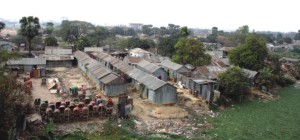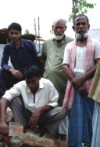|
Special Feature
'They are Taking Away Our Land'
A verbal eviction order threatens to take away the most precious possession that they have-- their ancestral land.
Aasha Mehreen Amin
 |
If the eviction order goes through, a huge area of land that originally belong to people of this locality, will be taken. |
Sitting in the middle of a pile of debris, Paribanu Begum, in her sixties, is still shell-shocked at the thought that by next week she may no longer have a home. The little tin-shed house that has been her only residence for the last fifty years or so will be demolished according to a verbal announcement over a microphone. The debris that surrounds her is the remnants of houses; the owners, panicked by the threat had decided to break the constructions themselves and retrieve as much as they could. But Paribanu refuses to take any such steps-- “If they go ahead with it there is nothing I can do. I will just stay here and die. Let them bulldoze me.”
Such bitter laments are common at this locality called Dhamal
 |
For the elderly residents of the area the thought of eviction is especially devastating. |
Court and its neighbouring areas Lala Shorai and Bashantek. Right next to the Dhaka Cantonment, it is a little known locality that spreads across around 101 acres of land and home to around three lakh people. About 70,000 of these residents can trace at least three generations of ancestry covering 70 years, perhaps even more than that, and by any kind of logic, they are the indigenous inhabitants of this land. But since as far back as the early sixties, this community has been left insecure and unsure of their lands because of greed of certain vested quarters and apathy of consecutive governments. Until recently, however, it had only been a nagging fear. Now with a fresh bout of threats from members of the Cantonment Board Office, the nightmare of being thrown out of their own land is too close for comfort. It was in the early 60s during Pakistan rule that an official notice had been sent to the area's residents announcing that the land had been acquired by the state in order to rehabilitate non-
 |
The agony of uncertainty: Will they be able to keep their homes? |
Bangali refugees. The locals were to be compensated through monthly instalments, which later turned out to be at first irregular, then non-existent. Forty-seven year old Haji Nuru Miah, who was born in Dhamal Court, says that when the war broke out, Pakistani government officials came to the area and forcefully took thumb prints from the local residents to take their land. This was the beginning of many attempts to grab their ancestral land. After the Liberation War, in 1972, community leaders went to Sheikh Mujibur Rahman, who, according to Kazi Abdul Jalil, Assistant Headmaster of a local high school, reassured them that there was no need to fear, as the very reason for the notice did not exist anymore, since the country was now independent. While the members of the community heaved a sigh of relief, they still wanted proper documentation that stated without any ambiguity that the land belonged to them. When Ziaur Rahman came to power he visited
 |
“This is our land. Where will we go?” -- Shabjaan Bibi, one of the oldest residents of the area |
the area and even he assured the community that their request would be granted. But there was no indication that the notice that threatened the community's very existence had been cancelled. In the 80s when Ershad held the reigns of power, a hand note was sent that said that if certain lands were not used for any specific purpose then it would not be taken. “In 1985 we sent a written appeal to the Land Ministry,” says Jalil“, and a letter was sent to meet the Land Acquisition Officer as instructed. He said he would take steps. Nobody objected to our appeal. But nobody did anything to help us either.”
According to Gazi Abdul Khaleque another local, who is in the contracting business, in 1987 an announcement was made through microphone stating that they were illegally occupying the land. “We contacted the people in the administration,” says Khaleque, “they said that local people could stay. But we got scared and thought that perhaps they were gradually trying to get us off the land.”
During the Awami League's government in 1996, there were talks of allotting the land so that forty percent would belong to the people and 60 percent to the army. An unfair deal no doubt, but at least it would not totally deprive the people of their land. But
 |
Kazi Abdul Jalil (left) and Gazi Abdul Khaleque (right) are among the senior citizens who are determined not to give up without a fight. |
when the BNP government took over, the agreement was cancelled and instead another ludicrous proposal was made. The locals would be compensated through proceeds from a shopping complex. In exchange all their lands would belong to the army. This thankfully did not ultimately take place. In 2003, the local community leaders filed a writ petition to stop any eviction order; the opposing side, the state, appealed but lost in the judge court. The arguments in favour of the people of the area were unambiguous and compelling. Jalil and many other senior citizens have the court documents that clearly state that the land they now occupy is their own. Thus the question of eviction does not arise. Others have cases pending at the courts.
 |
Living in constant fear. The men are at a loss. Where will they take their families? |
Yet now in spite of that court decree, these helpless people are being asked to pack up and leave.
“I have lived here all my life. My children have grown up here. My house, whatever bit of land I have inherited from my forefathers, everything is here. How can they just ask us to leave? Where
 |
The Dhamal Court primary school originally established in 1939. |
will I go at this age?” Jalil's demands answers for such questions that are echoed throughout the neighbourhood. Grandparents, parents, children and grandchildren, have shared this land for almost a century. It is where their ancestors settled, cleared the forests, grew crops and started building up a locality. Now there are a few schools, madrasas, an orphanage, masjids and all the little shops and establishment that help provide a living for these residents. The local high school has a few thousand students. Around 250 students are going to take their SSC examinations this year. They have no idea whether they will be in their own homes when they will be preparing for this crucial exam.
Md Bachchu Mia, a fifty-something year old shopkeeper cannot control his anger and frustration at this unjust move. “This is not government property. This is our land. We have the deeds and documents. The government has promised to rehabilitate even the peoiple in the bastis. But what about us? They are just taking away our land.”
Copyright
(R) thedailystar.net 2007
|
